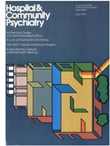Tardive Dyskinesia and the Long-Term Patient
Abstract
A psychiatric patient's long-term use of antipsychotic medication often results in the irreversible movement disorder, tardive dyskinesia. The author uses a composite case history as a basis for discussing the symptoms, diagnosis, epidemiology, and treatment of tardive dyskinesia. A number of drugs have been used to treat the disorder, but so far none have been effective. While tardive dyskinesia cannot be cured at this time, the author believes that it can be prevented by treating psychoses with the lowest possible dose of the least toxic drug for the shortest length of time.
Access content
To read the fulltext, please use one of the options below to sign in or purchase access.- Personal login
- Institutional Login
- Sign in via OpenAthens
- Register for access
-
Please login/register if you wish to pair your device and check access availability.
Not a subscriber?
PsychiatryOnline subscription options offer access to the DSM-5 library, books, journals, CME, and patient resources. This all-in-one virtual library provides psychiatrists and mental health professionals with key resources for diagnosis, treatment, research, and professional development.
Need more help? PsychiatryOnline Customer Service may be reached by emailing [email protected] or by calling 800-368-5777 (in the U.S.) or 703-907-7322 (outside the U.S.).



